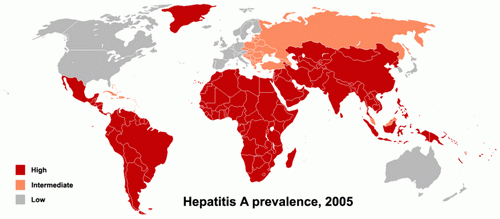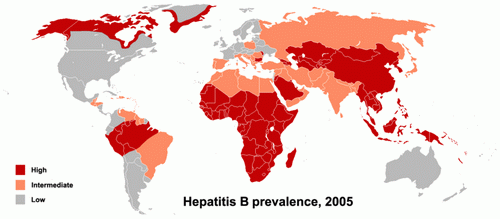Hepatitis A – Information for Travellers
Hepatitis A is a liver damaging disease caused by a virus. It is transmited fecal-orally which means it can be contracted by food or drink. It is wise to take preventative measures when travelling and visiting foreign countries to avoid contracting Hepatitis A. As a traveller, there are simple preventative measures you can take to avoid getting infected by a Hepatitis A virus: wash your hands with soap before handling food and after using the bathroom, don’t eat raw food, cook your vegetables and meat thoroughly, peel your fruit and only drink beverages from sealed bottles or cans.
Hepatitis A – Map of Prevalence
Canada, USA, Western Europe and Australia have very low occurrence of Hepatitis A. On the other hand Mexico, whole of Central and South America, entire Africa, Middle East and South Asia have high prevalence of Hepatitis A so getting vaccinated when travelling to those regions is highly recommended. The map below shows the prevalence of Hepatitis A in different parts of the world.

Hepatitis A Symptoms
If you get infected with Hepatitis A, you could experience one or more of following symptoms:
- Fever
- Malaise
- Abdominal Pain
- Loss of appetite
- Diarrhea
- Nausea
- Fatigue
- Jaundice
It is not unusual for Hepatitis A infection to go without any symptoms – aka it is asymptomatic.
Hepatitis A Vaccination for Travellers
You can get 1 year of protection against Hepatitis A after first dose of vaccination. Taking second dose is recommended 6 – 12 months later and then the protection gets boosted to 20 years. It is well worth it. There are hardly any adverse reactions to Hep A vaccination. I was experiencing tenderness in my shoulder at the injection site but that was entirely gone in less than 24 hours. My nurse told me that Hepatitis A vaccination starts providing protection shortly after the injection – stating that one could get it at the airport and by the time you reach your vacation or holiday spot, it would be protecting you, however that information doesn’t match other information I found on the internet. Some professionals say full protection against Hepatitis A may not be acquired until 2 – 4 weeks since vaccination.
Moral of the story is – get your Hepatitis A vaccination a few weeks in advance of travelling just to be on a safe side. However, since Hepatitis B is far more dangerous infection that could potentially lead to death (unlike Hepatitis A), it is strongly recommended to take Hepatitis B vaccination as well. A modern vaccination method called Twinrix ™ is now available which offers 20 years of protection against both Hepatitis A and Hepatitis B at the same time. Read more about Twinrix ™ vaccination on Hepatitis B – Information for Travellers with Map of Prevalence page.
Related Reading:
Hepatitis B – Information for Travellers with Map of Prevalence
Avoid Holiday Illness – Tips on NOT Getting Sick on Vacation
Medical Advice Disclaimer




